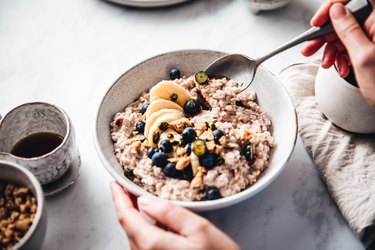
If you're dealing with constipation, upping your fiber intake is one of the first lines of attack dietitians recommend.
After all, a staggering 95 percent of Americans are not getting enough, according to January 2017 research in the American Journal of Lifestyle Medicine. And FYI, women should get 25 grams of fiber every day while men should get 38 grams, per the Academy of Nutrition and Dietetics.
Video of the Day
Video of the Day
Fiber helps maintain a functioning and healthy digestive tract and it helps the bowels work the way they should — that is unless you make some rookie mistakes when adding more fiber (or too much fiber) into your diet.
You never know how much you value regularity until something goes awry, so before you go scooping spoonfuls of fiber powder into your water glass, make sure you're increasing your fiber the right way — and your gut will thank you.
1. You Increase Your Fiber Intake Too Quickly
Patience is a virtue when it comes to increasing your fiber intake. One of the greatest benefits of fiber can also be your greatest enemy if you're eating more fiber than your body can handle.
Some fibers easily ferment in the gut, and this has a prebiotic effect (it feeds the good bacteria in the gut), but it also produces gas. That's why one of the biggest fiber mistakes is eating too much fiber and too soon, dietitian Erin Decker, RD, stresses.
"Increasing gradually will reduce the risk of gas and bloating," Decker says. So, the moral of the story is, go slow.
Tip
If your fiber intake is not where it should be, add one more plant food to your diet each day until you reach the recommended amount. Your body will get used to you upping the intake and, after a while, you'll barely notice any side effects.
2. You Don't Up Your Fluid Intake
There are certain types of fiber that have a constipating or stool-hardening effect, according to the Linus Pauling Institute. Finely ground wheat bran is one of those types, and it's found in many high-fiber cereals.
This can be problematic if you're not doing something to alleviate this potential discomfort. And that's where water comes in. Brianne Bell, RD, says the most common mistake she sees with increasing fiber is forgetting to increase fluids.
"Eating more fiber without increasing fluids can actually worsen constipation."
Try drinking 64 ounces of water per day to prevent constipation when you're increasing your fiber, the Linus Pauling Institute recommends.
Related Reading
Tips for Avoiding Constipation While Increasing Fiber
You now know that you need to increase your fiber slowly and drink fluids when adding more fiber to your diet, but you should also consider where your fiber is coming from.
It might seem convenient to get extra fiber by simply taking a supplement or eating a food product with extra fiber added in, but dietitian Megan Byrd, RD, recommends focusing on whole foods first.
"There are so many ways to get enough fiber in using whole, natural foods. Add chia seeds to your yogurt, flaxseed to your salads or kale to your smoothies."
Fruits, vegetables, whole grains, legumes, beans and seeds are all going to add to your fiber day. Here is an example of how to reach your recommended amount of fiber per day:
- One medium banana: 3 grams
- 1/2 cup rolled oats: 4 grams
- One medium apple: 4.5 grams
- 23 almonds: 3.5 grams
- One whole-wheat roll: 5 grams
- One cup cooked broccoli: 5 grams
- 1/2 cup black beans: 7.5 grams
- One cup raspberries: 8 grams
Physical activity is also important when you need your digestive system to stay on course.
Dietitian Jean LaMantia, RD, sums up her advice for keeping your digestive system healthy with three key points: "I always say, the key the healthy bowels is fiber, fluid and activity. You need all three!"